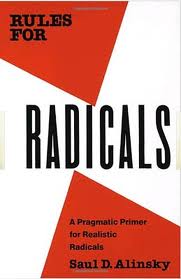SEEING THE RULE
Alinsky’s Rule #7 is a corollary to Rule #6 about having fun. If a particular campaign drags on too long, people stop having fun, are less energized, and eventually find it a drag. Often a group will roll out the same basic idea, but will seek to “freshen it” by redressing it. But it must not seem to be “the same old same old” or it will become a sailboat without wind.
One way to impact your opponent’s momentum is to draw out your response to their tactics. Your slowness to respond may thwart their momentum until their campaign drags out into a drag, to use Alinsky’s words. Classic “stonewalling” can make a campaign old and tiresome after a while. Effective campaign organization keeps goals fresh and changing, and keeps the end in sight.
USING THE RULE
Timing is everything. You can drive your action off into one of two ditches rather easily. You can either time it to be too short, becoming somewhat of a “flash in the pan;” or, you can time it to be too long, bringing about the problem of boredom. Your upfront planning must take timing into consideration, and this is the essential point of Alinsky’s 7th rule.
You want to make your message newsworthy and compelling for sure – but you don’t want it to become a part of the scenery. If your action is unchanging for a time or season, then try to “repackage” it. Or focus on other related matters. And remember that nothing is dynamic until it is specific. Campaigning about an ideal (e.g., “the dignity of people”) is not as energizing as a specific example of the ideal (“end human trafficking”).
As Alinsky put it, “Man can sustain militant interest in any issue for only a limited time….” You want their passion to remain at a high level. Shake it up. Stop whining in platitudes. Be specific so that you can make things dynamic, and create change. This LI student host gives an example of how a college student at LSU moved past the general rant about “liberal” professors, which had grown old. Instead, he created a campaign based on what the professor specifically said, and it helped make the school more accountable for what the license some professors took in presenting their own versions of politically correct ideas.








